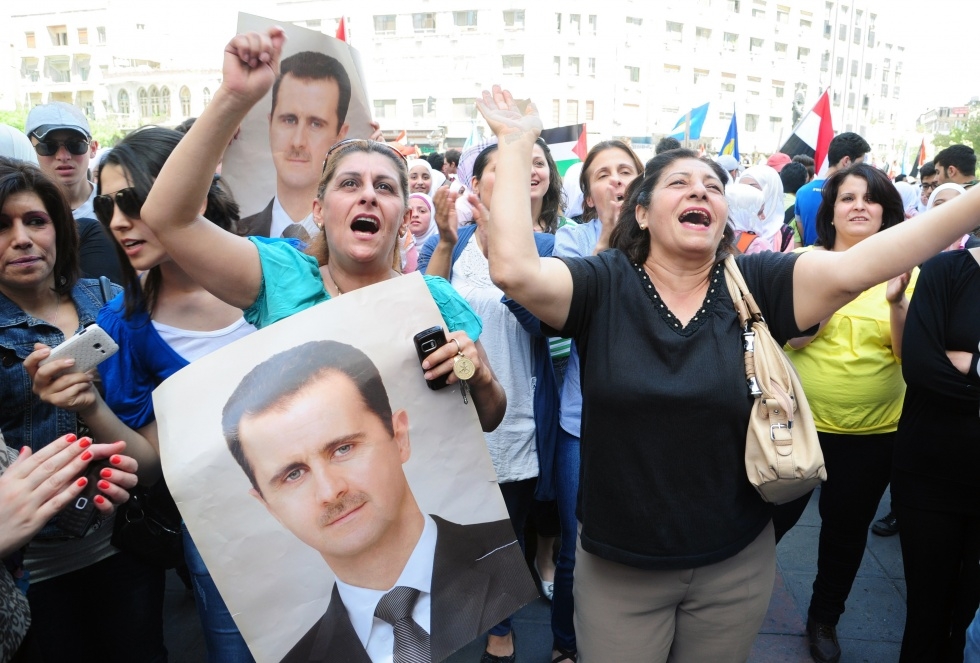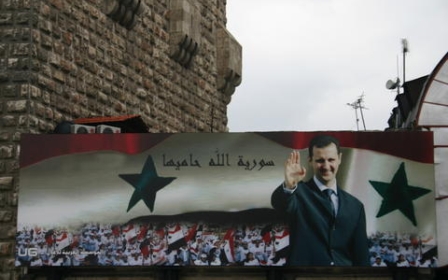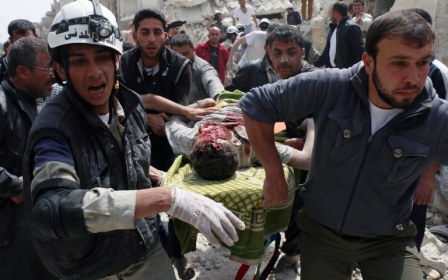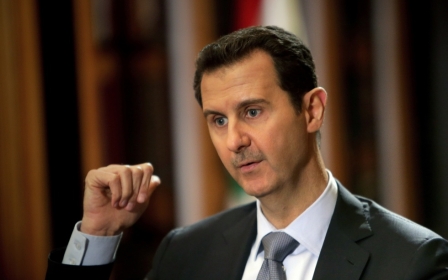Syria begins presidential campaigns despite conflict

Campaigning for Syria's June 3 presidential vote, which is expected to return President Bashar al-Assad to office despite the country's brutal conflict, opened on Sunday.
The vote will be Syria's first multi-candidate presidential election, but incumbent Assad, who is facing two other presidential hopefuls, is expected to easily win a third term in office.
In Damascus, Assad's campaign was already well underway on Sunday.
Throughout the city centre, dozens of posters featuring the Syrian flag overlaid with the word "together" and Assad's signature were on display.
Portraits of Assad were hung at a public garden near the commercial centre of Salhieh along those of his late father Hafez al-Assad, and of chief ally Hassan Nasrallah who head Lebanon's Hezbollah movement.
New MEE newsletter: Jerusalem Dispatch
Sign up to get the latest insights and analysis on Israel-Palestine, alongside Turkey Unpacked and other MEE newsletters
Hafez al-Assad ruled Syria with an iron grip from 1970 until death in 2000, when his son assumed office after a referendum.
A recent constitutional amendment did away with the system of presidential referendums, but electoral rules prevented those who have lived abroad in the last decade from running, ruling out most of the opposition.
Assad is running against two relatively unknown competitors -- Maher Abdel Hafiz Hajjar and Hassan Abdullah al-Nuri.
Hajjar is from Syria's second city of Aleppo, which has been devastated by fighting that broke out there in 2012, and is an independent MP and former member of the communist party.
Nuri is a Damascus businessman who was a member of the domestic opposition tolerated by Assad's government.
In the capital's Sabaa Bahrat neighbourhood, one billboard hung "by citizens of Syria" proclaims: "We won't close our eyes until we have said yes to the ophthalmologist," a reference to Assad, an eye specialist by training.
"We vote for you, 2014," it adds.
Elsewhere, posters read "our Bashar, we will not accept a president other than you. We have chosen you, you have our loyalty."
Assad's competitors have some representation too, with posters supporting Nuri seen on some Damascus streets.
They call for "a battle against corruption" as well as "a free economy" and the "return of the middle class."
Nuri's campaign reels have also aired on state television.
But for the moment, Assad appears to dominate the campaign, with posters showing the smiling leader and the words "we love you" underneath.
The elections will be held despite the fighting that has raged since an uprising began against Assad in March 2011.
The conflict has killed more than 150,000 people, displaced nine million from their homes and left large parts of the country beyond the control of the government.
Voting will only be held in areas under government control and refugees who left Syria through unofficial crossings are also barred from participating in the election.
Nearly 2.5 million Syrians are registered as refugees in neighbouring countries, including Turkey, Lebanon and Iraq.
60 dead in fresh fighting in Syria
At least 60 people were killed, including 18 children and five women, by Syrian regime forces during air and ground attacks, Saturday, according to the London-based Syrian Network for Human Rights.
Assad's forces killed 24 people in Aleppo, 14 in the suburbs of Damscus, nine in Daraa, four in Hama, three each in Latakia, Homs and Deir-ez Zor, the network said.
Residential areas were also destroyed after barrel bombs were dropped around Aleppo, driving residents out to safer zones, according to the Local Coordination Committees of Syria, a network of local opposition groups.
The committee also said Idlib, Latakia, Daraa and some districts of Damascus have seen intense air strikes over opposition-held areas.
Meanwhile, Syrian security forces "neutralized" a large number of armed groups during operations and their vehicles were demolished, said Syria’s state-run SANA news agency.
Syria has been gripped by almost constant fighting since the regime launched a violent crackdown in response to anti-government protests in March 2011, triggering a conflict, which has spiralled into a civil war.
Middle East Eye delivers independent and unrivalled coverage and analysis of the Middle East, North Africa and beyond. To learn more about republishing this content and the associated fees, please fill out this form. More about MEE can be found here.




